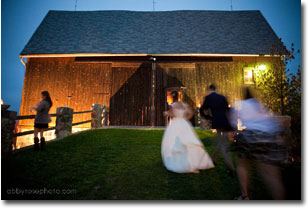Scio Township innovates to preserve rural character
By Doug Lewan, AICPThe conversion of a beautiful, historic barn in Michigan’s Scio Township into a special events hall drove the township to create a zoning category that provides a new and unique way to protect and preserve agricultural land.
Several brides had fallen in love with the rustic charm of the turn-of-the-century barn at Misty Farms and had booked their wedding receptions there. That’s when I, the township’s community planner, got the phone call. Meeting halls are only permitted in the township’s commercial zones.The zoning ordinance is, by its nature, prohibitive and inflexible. When a zoning ordinance meets a violation like Misty Farms, the results are usually not pretty for either party. You’re immediately in conflict.Others might have slammed the barn door before anybody said, “I do.” But I was very much taken by the beauty of the place. The owners were thoughtful and earnest. I saw a chance to help them and bring new opportunities to the township.My efforts were aided by the fact that the township’s master plan specifically establishes open space, natural feature and agriculture preservation as priorities. A culture of preservation is pervasive.This challenge fell outside the traditional approaches to preserving agricultural land, such as planned unit development, open spaces paired with housing clusters and sliding scale zoning in agricultural zones.We instead thought about non-traditional, permissive approaches
- Agricultural tourism
- Bed & breakfast
- Limited retail
- Wineries and cider mills
- Meeting space & other related uses
We wrote a zoning ordinance that allowed commercial land uses that are complimentary and accessory to the primary agricultural land use, subject to all provisions of the ordinance. We established these as special land uses, requiring a public hearing, so neighbors could weigh in.Consider specific non-discretionary standardsfor these types of uses including:
- Lot Area minimum
- Lot Width minimum
- Access to paved roads (or some similar standard)
- Buffer setbacks
- Conformance to community noise standards
Of course the barn had to meet building codes, which turned out to be surprisingly easy.In addition to commercial activities like cider mills, farm stands, wineries and meeting spaces, the zoning classification also permits value-added procedures, for example, a farmer growing apples could add a commercial kitchen on his property to bake pies. Initiatives like these might save a struggling farm, while preserving the property for a subsequent owner to use solely for farming.Misty Farms has added a second site, Misty Valley, with a natural pond site and garden as wedding locations. They accommodate one event per weekend from May through October and, at this writing, are only accepting bookings for 2015.

